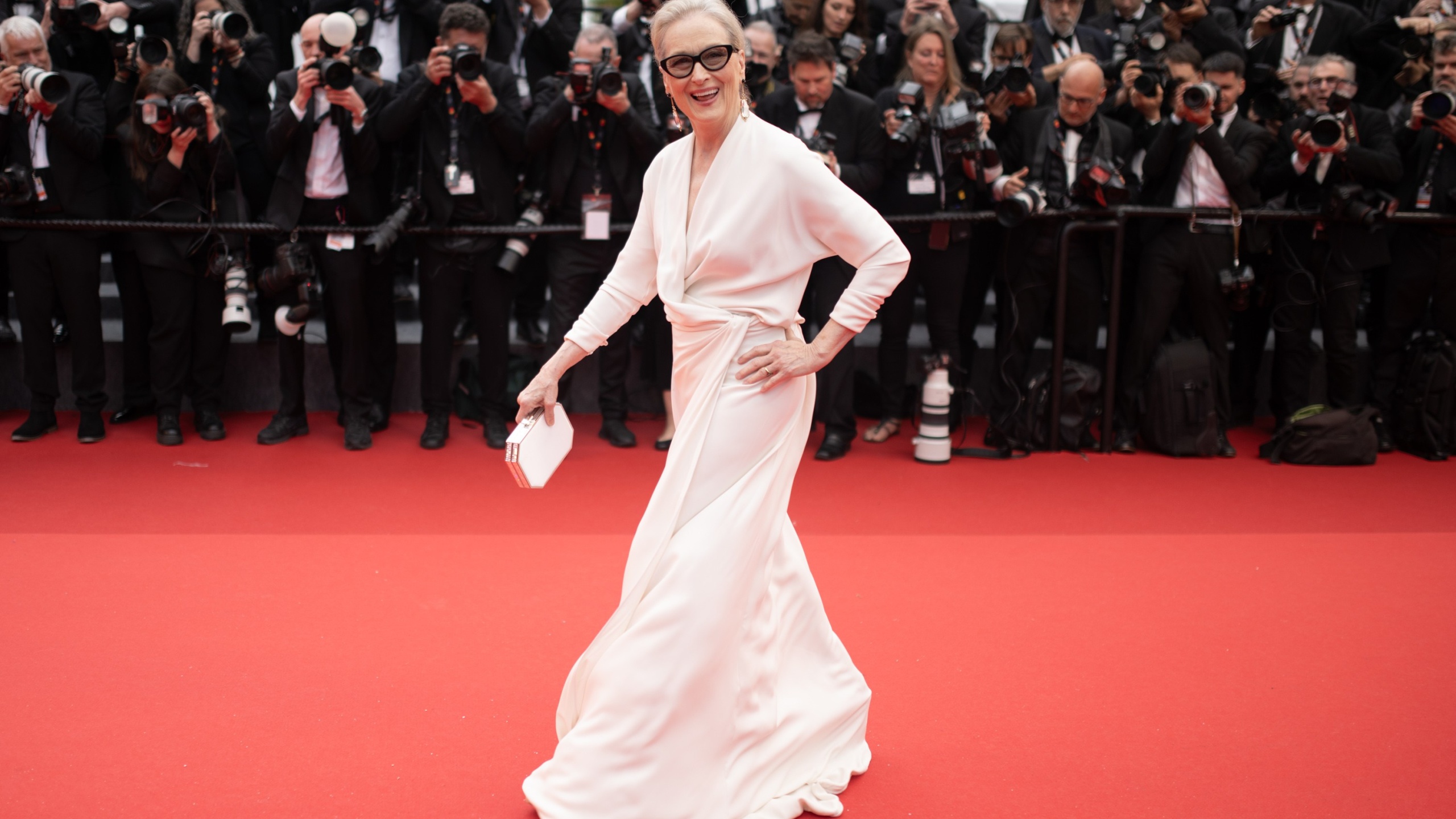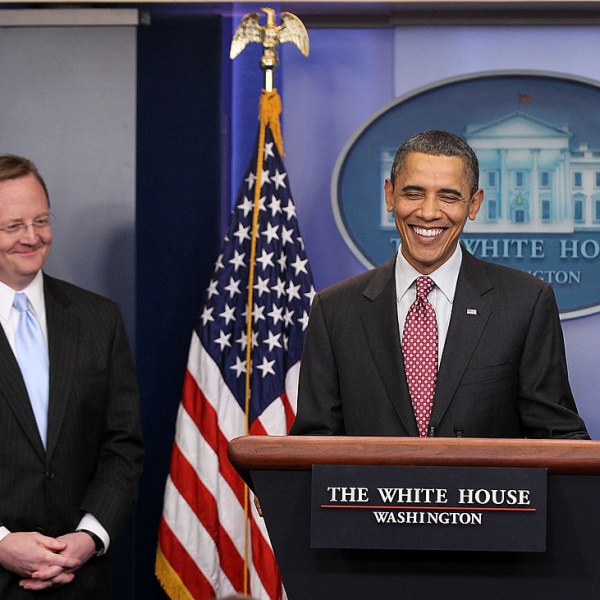The usual Cannes opening night ritual — introduce the jury and its president (auteur Greta Gerwig) who will weigh in on 22 competition titles — was co-opted by the larger-than-life presence of Meryl Streep, resplendent in white. She graciously accepted the Palme d’Or from a sincere Juliette Binoche, resplendent in red, who wrote her heartfelt tribute from one artist to another.
“You changed how women are portrayed,” Binoche said, crying. The two actresses were well-matched. And the black tie audience at the Palais gave Streep a lengthy, sustained ovation, which clearly both delighted and embarrassed her. She pretended to leave.
That ovation repeated Wednesday at the packed Salle Debussy, as Streep, a little worse for wear after debating the merits of Quentin Dupieux’s acting comedy “The Second Act” at the Cannes after-party, answered questions from Didier Allouch. “I didn’t go to bed until 3 talking about the amazing film,” she said. What Streep, a little hungover, remembered from the Palme d’Or presentation was the warmth from the crowd. “I felt just a wave of feeling coming from the audience. And it’s so much bigger than I thought. So many tiers of people all the way up to the top. Yeah, a lot.”
She portrayed herself as “a small town girl from New Jersey,” now a suburban mother of five grown children and five grandchildren, who doesn’t get out much. She did require 12 bodyguards 35 years ago during the chaotic early days of Cannes when she attended with Fred Schepisi’s “A Cry in the Dark.”
“There wasn’t the same security so that all the barriers weren’t there,” she said, “and people with cameras were so definitely [she gestured ‘in your face’], that was insane. And I almost didn’t recover from that. I went to the hotel room, and I couldn’t believe how wild it was. The world has changed a lot.” She doesn’t remember taking home the Actress Palme d’Or. “I live a very quiet life, and I don’t get any respect at home,” she said.

Streep admitted to rewriting her roles in two movies: Michael Cimino’s 1979 “The Deer Hunter,” which earned her a first Oscar nomination, and the ending for writer-director Robert Benton’s “Kramer vs. Kramer,” which she described as a male-oriented “revenge” movie about divorce. That earned her an Oscar the following year for Supporting Actress. Streep left her statue in the restroom, as she had to put it down to manipulate her bulky gown. “But someone found it,” she said. Streep holds the record for most Oscar nominations, 21, and boasts three wins (“Kramer vs. Kramer,” “Sophie’s Choice,” and “The Iron Lady”).
“Every movie made is made of its moment, even if it’s set in another time,” she said. “Or it’s made to make money. So that’s another thing. But the serious films and the passion projects and the ones that are maybe difficult to finance because people aren’t sure, they’re the ones of their time. Even the stupid ones are of their time. ‘Kramer’ absolutely met its moment in feminism and the backlash to feminism and, and the bumpy road that’s leads us here even today.”
While some question continuing issues of income inequality in Hollywood, as well as the longterm impact of the Time’s Up movement, two causes Streep has fought hard for, she feels progress is being made. “God, there’s so many big female stars,” she said. “Although Tom Cruise is probably way over the top. But it’s a lot different than when I started. With deals, there was a lot of leveraging and trading: ‘I’ll give you this big male star if you …’ We were undercut, women, in those negotiations. Movies are a projection of people’s dreams. Even movie executives who are making a greenlight, before there were women in greenlight positions at the studios, it was hard for men to see themselves in a female protagonist. It was not difficult for the women executives to see themselves in a male protagonists. But the hardest thing is for a male to live through the female in a movie who is a lead, and that’s what inhibited them. It was a personal thing. It’s not always just about money. They just didn’t get it.”

Streep often stood out in movies mainly because “that’s the days when there was only one woman in the movie,” she said. “Sophie’s Choice” — her next Oscar win — clearly has stuck with Streep over the years. The wrenching scene when Sophie is forced by a Nazi guard to choose which of her two children to keep and save was done in two takes. “It was upsetting,” she said. “Yeah. I don’t like to think about it.”
When she talks about acting, which she clearly doesn’t enjoy, Streep describes herself as a lost empty vessel, “raw,” when she arrives after a sleepless night to face a challenging scene. Her training, she says, comes in handy when you have to repeat things over and over. As for her extraordinary skill at doing accents, she hates working with dialogue coaches and prefers to do the work on her own. “I do pick it up,” she said. “So it’s not a difficult thing, but it certainly expands the chances to play different women because I’m interested in people that are not like me. We’re all much more alike than we want to think.”
Men started to identify with parts she played when the women had professions, Streep said. “Because the woman had an occupation other than the men. So the occupation in ‘Out of Africa’ was she was a wonderful writer, and she was trying to survive on a coffee plantation and keep everybody alive. She has another life, other than him.”

Like everyone else, Streep is fond of the romantic lake shampoo scene in “Out of Africa,” once Robert Redford got lessons in how to massage her scalp properly. Then she didn’t want it to end, even if several hippos were hovering nearby. “It was like a sex scene,” she said.
Like many actors who have worked with Clint Eastwood, Streep adored shooting fast short takes on “Bridges of Madison County.” “He made that film in five weeks. Because he liked to get out at 5 o’clock, so that he could be on the golf course. And it was very important to him. So he shot quickly. He would sometimes rehearse on camera and say, ‘OK, let’s move on.’ He takes the rehearsal. That was in the movie. And his crew were so on par. They were ready to go. They knew that this is the way he worked. And he never raised his voice, except once, when somebody was talking outside. And we were in the kitchen having a big scene and he could hear them and he opened his mouth, and he made a sound that was so loud. No one has ever heard him make that sound. It really shook everybody for the rest of the day. It was wonderful to work that way.”
Even though the box office hits like “Bridges of Madison County” and “Out of Africa” boosted her box office clout, Streep continues to choose her films the same way. She’s a character actress, and always will be. “I just would fall in love with stories and it didn’t matter,” she said. “I wasn’t aiming for a blockbuster ever, really. And the ones that ended up being blockbusters, ‘Mamma Mia!,’ ‘The Devil Wears Prada,’ “I was 58 and 60 years old,” she said. “When those weren’t going to be anything except fun. I didn’t know they were going to be big but I knew I could get them made!”



